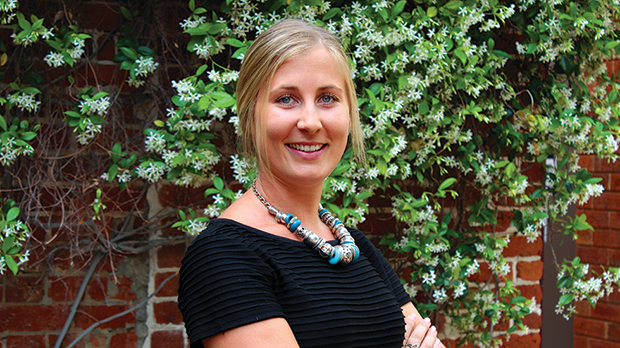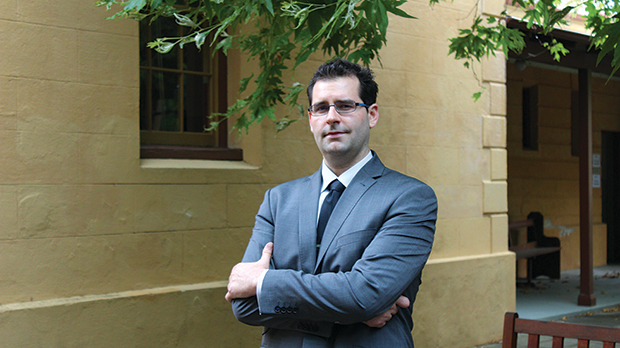
Alice Fairfoul’s real-life learning all across the state saw her in an envious position before she’d even graduated, having already accepted an offer to join Sacred Heart School in Beagle Bay for the start of the 2015 school year. She tells us about how her university experience put her in the driver’s seat.
Having graduated this month from Notre Dame with a Bachelor of Education (Early Childhood and Care) to her name, Alice says the integration of theory with practical teaching experiences at Notre Dame gave her the skills and confidence to deliver the education and care that growing minds need in the classroom.
Alice accepted the position with Sacred Heart while she completed an internship with the Catholic Education Office of WA’s Kimberley Calling Program. The outreach program aims to improve the literacy and numeracy outcomes of Catholic school students in some of the region’s most remote communities, including Ringer Soak, Warmun, Gibb River and Billiluna.
“I chose to study at Notre Dame because of the University’s personalised approach to education and its commitment to ensuring students have opportunities to experience real-life learning,” says Alice. “All students, regardless of their age and location, need to have access to the best possible learning environment, where their educational and personal needs are met. I hope to be able to inspire the students in my classroom at Sacred Heart School just as I have been inspired by my lecturers and tutors at Notre Dame.”
Inspiring kids is key to teaching, and as such, the School of Education emphasises the importance of students getting their hands dirty, experiencing practical learning opportunities where they can develop a real feel for what the actual teaching environment is like.
Across the four-year Early Childhood and Care degree, students undertake a massive 32 week practicum in a number of different classroom settings from early learning centres to primary schools, in tandem with specialised early childhood units of study. These provide students with an all-inclusive, ground-up learning approach, and helps them to gain confidence in their teaching abilities.
“Early childhood is a crucial time of development. Undertaking a specialised early childhood degree is recognition of this crucial time for children,” Christine McGunnigle, the co-ordinator for Childhood Education and Care Programs in Notre Dame’s School of Education, Fremantle, said.
“Notre Dame’s Early Childhood and Care degree focuses on developing confident and passionate early childhood professionals who are industry ready. Upon graduation, students have worked in a range of settings, across birth to age eight, and have developed strong professional connections.” Whether you’re interested in primary, secondary or early childhood teaching, Notre Dame offers the same level of in-depth practical experience.
Notre Dame offers courses in primary, secondary and early childhood education from the Fremantle campus, with applications still open for 2015. Find out more at nd.edu.au.

JUSTIN KEOGH The Thinking Man’s Lawyer
Articled Clerk, Office of the Director of Public Prosecutions
Don’t be fooled; philosophy isn’t just sitting around in togas and talking about the afterlife. For law graduate, Justin Keogh, studying the ancient discipline provided him with critical thinking and structured reasoning skills that he later found essential for succeeding in his profession.
After graduating, Justin became an Articled Clerk at the Office of the Director of Public Prosecutions for Western Australia, and believes the disciplines of philosophy and ethics, taught to all undergraduate students at Notre Dame as part of the University’s Core Curriculum, were key in developing his ability to succeed in such a challenging role.
Having studied and tutored in the University’s School of Philosophy & Theology, Justin has seen from both sides how philosophy encourages abstract thinking and academic rigour, as well as challenging a person’s understanding of morality. “While the content of philosophy has some cross-over, particularly in jurisprudence, the skills acquired from its study are critical for identifying the heart of an argument, structuring a coherent response and exploring a viable solution. It goes without saying that these skills are not just relevant to law,” he says.
“Ethics (moral philosophy) is even more applicable. An appreciation of ethics is essential for understanding concepts relating to justice, fairness and equality; concepts central to most systems of law. Further it is this appreciation, sometimes innate, that draws many people to seek out a career in law in the first place.”
The Objects core curriculum program is based around the principle of growing every student not just in terms of their employability, but also personally, professionally and spiritually. As such, Notre Dame students are uniquely able to actively participate in the developing culture of campus life, in the classroom, through volunteering initiatives, religious pursuits and formation, and in a number of student clubs and societies.
“By participating in the campus life you get to associate with like-minded people; many of whom will become close friends,” Mr Keogh said.
“You’re in a space where you can practise the skills you are taught in class in a safe and supportive environment, while having the opportunity to create a legacy that will exist on campus long after you leave.” The historic campus is another perk of attending the university, with classes taking place in buildings dating back to 1884 set amongst the beautiful Fremantle cafe strip, with the ocean within walking distance.
Professor Doug Hodgson, the Dean of the School of Law at Notre Dame Fremantle, says that the students there gain an edge from taking practical courses, such as advocacy, alternative dispute resolution and ethics, where they are taught how to act in the courtroom and ways to deal with ethical challenges that may arise throughout their careers.
“The Law School prepares students for exciting careers in a variety of fields, such as law, politics, government, business and education, through innovative course electives like Aviation Law and Social Media and Law and a host of others,” Professor Hodgson said.
“These are likely significant contributors to the Notre Dame School of Law having a 90 per cent graduate employment rate, according to the 2015 Good Universities Guide. Our graduates lead by example in their careers with confidence knowing that a Notre Dame degree delivers the ability to think critically; to act justly; and to serve humanity with dignity and charity.”
To find out more about a Bachelor of Laws and Philosophy from Notre Dame at the Fremantle campus, visit nd.edu.au.